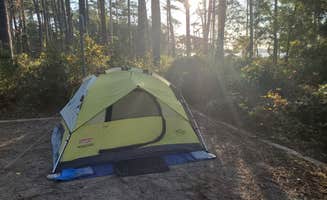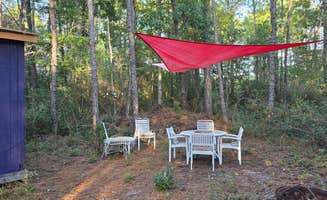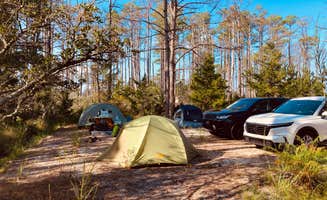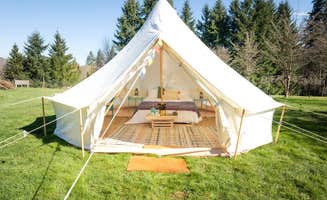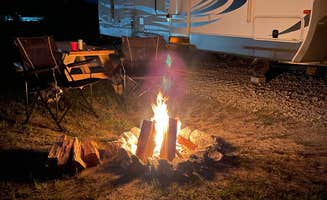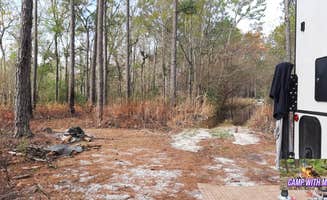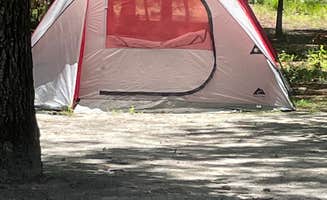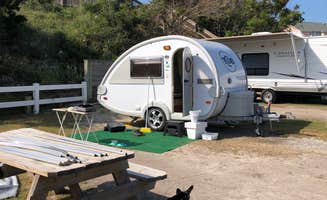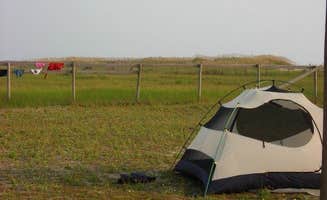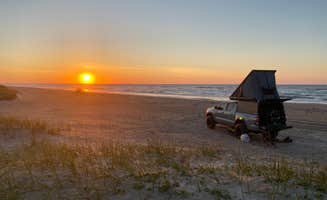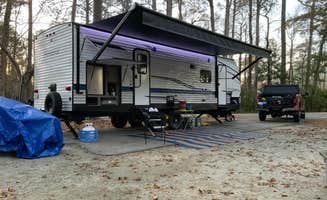Atlantic Beach camping sites offer diverse terrain options spanning from heavily wooded national forest locations to barrier island beach camping. The region features a mix of primitive sites and established campgrounds with varying levels of amenities across the Crystal Coast area. Summer temperatures average 85-90°F with high humidity, while winter lows typically range from 30-50°F with moderate rainfall throughout the year.
What to do
Beach fishing access: 20 minutes from Oyster Point to Atlantic Beach. At Oyster Point Campground, campers can enjoy proximity to prime fishing spots. "You can gather your own wood as there are nearby paths to gather large and small wood. The cost is $10 per site and one site has a double pad for $20 a night. It is quiet and enjoyable," notes Joshua F.
Paddling opportunities: Direct site access at some locations. Croatan National Forest Oyster Point Campground offers water access for kayaking from select sites. Laura F. explains, "We were able to launch kayaks almost directly from campsite #11. Tent pads are big enough for 1 large tent or 2 small tents."
Off-road beach driving: Requires permits and proper vehicle. At South Core Banks Beach Camping, visitors need special preparation. "You need 4WD to get around the island but most of the ferry places have atv rentals. Only accessible by ferry/boat, call a few weeks ahead to reserve a spot on the ferry cause they fill up quickly," advises Jason D.
What campers like
Waterfront sites with sunset views: Many campers praise the water access at Cedar Point Campground. One reviewer notes, "We camped here in October 2020 and stayed in site 17. It is a great site with lots of room between you and the next camper." Martha S. adds that "The campsites are shaded by large, tall pines and other assorted trees."
Clean, well-maintained facilities: Emerald Isle RV Resort receives consistent praise for its cleanliness. "Super clean bathhouse. The staff would drive around 3 times per day to collect your trash," reports Donna E., while Cannon W. appreciates the "Handicapped beach access. Very clean restrooms and showers. Clean pool."
Privacy and seclusion: Less developed sites offer more natural surroundings. At Oyster Point, Mambo M. highlights, "Gorgeous wooded sites, well-maintained. Waterside! Literally a 60-second walk to water from campsite. Great hiking & kayaking. Very quiet & private."
What you should know
Seasonal considerations: Many coastal campgrounds have distinct seasonal patterns. "No bug problems whatsoever in mid to late October. Forest Service road in is newly graded and graveled. Zero potholes," notes one Oyster Point camper, contrasting with summer experiences when "the bugs are bad in June and bug spray didn't really help."
Reservation requirements: Most campgrounds require advance booking, especially during peak seasons. For Great Island Cabin Camp, access requires ferry transportation: "It is boat in only and only 4 wheel drive accessible, no paved roads. You can camp on the beach or stay in one of the NPS cabins," explains Linda M.
Weather preparations: Coastal weather can change rapidly. "Show up in October and you may get to help the rangers protect the sea turtles as they hatch. Waterspouts are extremely common here, so use sandbags with your tent," advises a South Core Banks visitor.
Tips for camping with families
Pool access for kids: Some campgrounds offer swimming facilities. At Emerald Isle RV Resort, one camper shares, "It's clean, close to the beach, has a little pool and they do fun family activities, too (like outdoor movies and Christmas in July!)."
Wildlife viewing opportunities: Many sites offer natural encounters. At South Core Banks, Trey H. reports, "We had three young male horses that were always roaming within sight. They even walked close by our campsite."
Resource planning: For remote sites, significant preparation is necessary. At Great Island Cabin Camp, Sarah G. advises, "The only on-island supplies are ice and gasoline, so you must pack in everything. Tap water is potable but tastes very desalinated, so bottled water is recommended."
Tips from RVers
Site leveling challenges: Some campgrounds present challenges for setup. At Whispering Pines Campground, one RVer notes, "Un-level gravel camper parking areas made it hard to get our camper level."
Electrical service quality: Service reliability varies between campgrounds. Cedar Point Campground provides both 30 and 50-amp options, but at some sites "there are serious issues with the electric connections, which you have no choice but to pay for."
Hookup availability: Water access varies significantly. At Cedar Point, Steve V. explains, "Upon arrival, you check in with the host, drive to water fill area and fill up your fresh water tank. There are additional water fill faucets throughout the park. Your site is equipped for both 30 or 50 amp campers."



